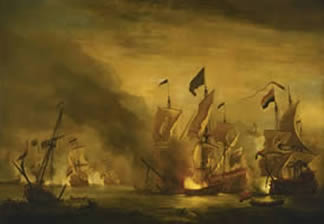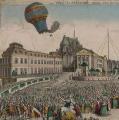

French under Napoleon III & Italians (more correctly Piedmont-Sardinia) under Victor-Emmanuel II (later first king of Italy) v. Austrians under the young Emperor Franz Joseph (with Germans in reserve). Italians were trying to regain Lombardy and Venetia from five generations of Austrian rule. France had agreed to help and in exchange would receive Savoy and Nice.
Solferino was the greatest land battle since Austerlitz, with 270,000 men clashing for 15 hours from 4 a.m. to 7 p.m. There were 40,000 casualties. In the end the Austrian forces were driven from their positions but the carnage was so great that Napoleon III decided he could not continue with the war; by 11th July he had signed a peace treaty gaining Lombardy for Victor Emmanuel but leaving the Austrians with Venetia. On hearing the news, V-E's prime minister Cavour resigned, declaring that Italy had been betrayed. Italy had to fight another war in 1865 to regain Venetia.
The battle was witnessed by Swiss businessman Henri Dunant (pictured right), who happened to be in the area whilst on a business trip to Italy. He was so deeply moved by the plight of the many wounded, many of whom went on to die of wounds or be finished off by enemy forces, that he wrote his famous book "A Memory of Solferino", and is credited with founding the Red Cross. By 1864, 14 nations had signed the Geneva Convention which covered the treatment of wounded and prisoners.
An grisly extract from his book :
"For several days running I handed out tobacco, pipes and cigars, in the churches and hospitals, where the smell of the tobacco, smoked by hundreds of men, was of great value against the pungent stench which arose as the result of crowding so many patients together in stifling hot buildings. The stocks of tobacco in Brescia were very soon exhausted, and more had to be brought from Milan. Only tobacco could lessen the fears which the wounded men felt before an amputation. Many underwent their operation with a pipe in their mouths, and a number died still smoking"
[thanks to JL for contributing most of this post]
23 June, 2006
The Battle of Solferino (23rd June, 1859)
Posted by
cardinal_wolsey
at
10:14 PM
0
comments
![]()
Labels: 19th Century History, Battles, Italian History, Military History, Solferino
17 June, 2006
16th June, 1904. Bloomsday


This is the day that Leopold Bloom, a central character in James Joyce's "difficult" (ie weird) novel Ulysses, begins his walk around Dublin. Ulysses is based loosely on Homer's The Odyssey, and divides opinion as to whether it is a) work of genius or b)pretentious tosh ("Man goes for a walk around Dublin. Nothing happens").
There is a neat summary, with reader views for and against, on the BBC website
Posted by
cardinal_wolsey
at
10:20 PM
1 comments
![]()
Labels: 20th Century History, Irish literature, James Joyce
12 June, 2006
12th June, 1839. Game of Baseball invented in USA (allegedly)

The Americans think that they invented baseball....but not so fast you colonial types. It might in fact be based on an old English folk-game called Base-Ball, as illustrated here.....
More details including a related ancient game called Stool-Ball (don't ask) can be found at : http://en.wikipedia.org/wiki/Origins_of_baseball
Posted by
cardinal_wolsey
at
10:48 PM
1 comments
![]()
Labels: 19th Century History, Baseball, History of Inventions
09 June, 2006
6th June, 1672. Battle of Sole Bay


The Battle of Sole Bay formed the main engagement of the Third Anglo-Dutch War, and was a essentially a draw. Sole Bay is off the Suffolk coast near Southwold, and the battle is commemorated on the label of Adnams Broadside bitter (abv 6.3), which is brewed in Southwold.
The English thought they had an agreement with the French fleet to support them against the Dutch navy, but when the Dutch attacked from an unexpected direction, the French made a tactical withdrawal hoping that the English and Dutch fleets would reduce eachother to smithereens. Never trust the French!
There were heavy casualties on both sides: fireships were used to set opposing men-of-war alight, and many sailors were burnt as well as drowned, or hit by cannon shot. Body parts were washed up on the beach for some time afterwards.....nice.
There is an excellent blog devoted to the Anglo-Dutch wars.
Try this link to sample an album of sea shanties on : amazon.com
Posted by
cardinal_wolsey
at
10:29 PM
0
comments
![]()
Labels: 17th Century History, Anglo-Dutch Wars, Battle of Sole Bay, Battles, Military History, naval history
05 June, 2006
5th June, 1783. First Public Balloon Flight

The Montgolfier brothers make the first public balloon flight.
This from inventors.about.com...[incidentally, in their "what's hot" list, they have the history of frozen food.....geddit?]
"The Montgolfier brothers, born in Annonay, France, were the inventors of the first practical balloon. The first demonstrated flight of a hot air balloon took place on June 4, 1783, in Annonay, France.
Joseph and Jacques Montgolfier, paper mill owners, were trying to float bags made of paper and fabric. When the brothers held a flame near the opening at the bottom, the bag (called a balon) expanded with hot air and floated upward. The Montgolfier brothers built a larger paper-lined silk balloon and demonstrated it on June 4, 1783, in the marketplace at Annonay. Their balloon (called a Montgolfiere) lifted 6,562 feet into the air.
First Passengers
On September 19, 1783, in Versailles, a Montgolfiere hot air balloon carrying a sheep, a rooster, and a duck flew for eight minutes in front of Louis XVI, Marie Antoinette, and the French court.
First Manned Flight
On October 15, 1783, Pilatre de Rozier and Marquis d'Arlandes were the first human passengers on a Montgolfiere balloon. The balloon was in free flight, meaning it was not tethered.
On January 19, 1784, a huge Montgolfiere hot air balloon carried seven passengers to a height of 3,000 feet over the city of Lyons.
Montgolfier Gas
At the time, the Montgolfiers believed they had discovered a new gas (they called Montgolfier gas) that was lighter than air and caused the inflated balloons to rise. In fact, the gas was merely air, which became more buoyant as it was heated."
Posted by
cardinal_wolsey
at
11:02 PM
0
comments
![]()
Labels: 18th Century History, History of Inventions, Montgolfier Brothers
